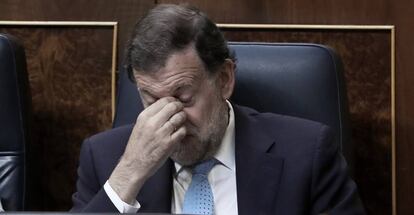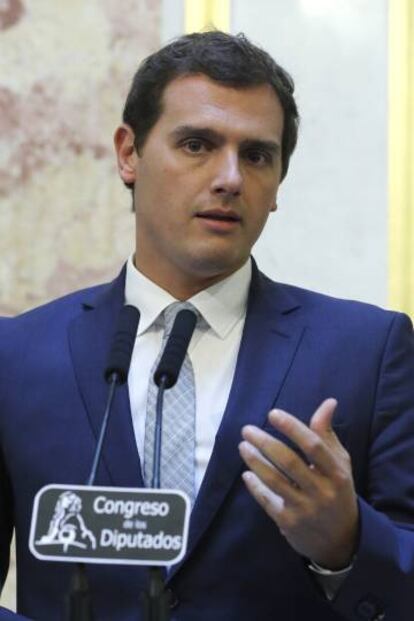King begins talks with party leaders; little hope of government emerging
Opposition accuses acting PM Rajoy of lack of leadership and unambitious proposals

A decisive week in Spanish politics has begun, with the first of several meetings between party leaders and King Felipe VI scheduled for Tuesday.
The meetings aim to determine whether any one of the four leaders of Spain's main parties, the Popular Party (PP), the Socialists (PSOE), Podemos, or Ciudadanos, stands a chance of forming a government following the inconclusive election of June 26, which was itself a repeat of an equally indecisive poll in December.
Acting Prime Minister Mariano Rajoy, whose PP won 137 seats but fell short of a congressional majority, has so far been unable to secure support from the main opposition Socialists or the reform party Ciudadanos.
Rajoy is feeling reinforced by his double victory at the polls in December and June, and refusing to step aside to let someone else head the party
In order to become the next prime minister, Rajoy needs other parties to cast yes votes – or at the very least to abstain – at the investiture vote that should take place in early August in Congress. But Rajoy seems set to follow the same strategy he adopted after December's gridlock: refusing to even stand for reinstatement if he is not previously guaranteed success.
Rajoy’s ideal situation would be a yes vote from Ciudadanos in the first round of the investiture vote, which would add 32 seats to his own for a total of 169 out of the 176 he needs. This would pressure the PSOE into conceding an abstention in the run-off, when all that is required is more yes votes than no votes in the 350-seat chamber.
But with just 48 hours to go before Felipe VI meets with the leaders of Spain’s four main parties – including the anti-austerity Podemos – Sánchez and Rivera are refusing to go along, saying that it is not up to them to “do Rajoy’s job.”
“There is no margin for negotiations. We would sit down to negotiate a government program if there were any margin for renewal of the PP leadership,” said Ciudadanos deputy chief José Manuel Villegas, alluding to the fact that his party would be more open to a PP government under someone other than Rajoy.
Sign up for our newsletter
EL PAÍS English Edition has launched a weekly newsletter. Sign up today to receive a selection of our best stories in your inbox every Saturday morning. For full details about how to subscribe, click here.
“We don’t want the PP to govern Spain,”said Socialist congressional spokesman Antonio Hernando, whose party says it will oppose a PP government no matter who is at the helm.
“Unambitious”
Although Felipe VI will likely ask him to try to form a government when they meet on Thursday, Rajoy has still not managed to get Socialist leader Pedro Sánchez and Ciudadanos president Albert Rivera to sit down with him for talks.
Both Rivera and Sánchez feel that the working document they recently received from the PP as a basis for talks is “unambitious,” “lacking detail” and essentially nothing more than a summary of the conservative party’s platform.
Both opposition leaders also feel that Rajoy should take responsibility for all the corruption cases affecting his party, and see him as “lacking leadership.”

Meanwhile, the PP is warning that it would be “absurd” for Rajoy to make a bid for office if he lacks the necessary support to be successful.
“Nobody agreed to sit down with us to negotiate the PP’s document, and that’s unreasonable,” said Rafael Hernando, the party spokesman in Congress. Hernando said that all three parties were in touch almost on a daily basis, however.
“If they came up with an alternative, we would analyze that alternative,” he added.
But Socialist sources said there were no daily contacts between themselves and the PP.
No alternative majority
This time around, there are also no official talks between the PSOE and any other political party. Following the failure of Sánchez’s overtures to Podemos, which did not support his investiture bid after the first election, relations between both parties have become frayed.
Rajoy is feeling reinforced by his double victory at the polls in December and June, and refusing to step aside to let someone else head the party. Nor is he showing signs of offering alternative solutions such as submitting to a vote of confidence halfway through the term.
Meanwhile, Sánchez is not talking to anybody, and Rivera notes that his 32 seats are not decisive, that he has already agreed to abstain rather than vote no, and that it is now up to the PSOE, with its 85 votes, to do the same in order to avoid a record third election in Spain.
English version by Susana Urra.
Tu suscripción se está usando en otro dispositivo
¿Quieres añadir otro usuario a tu suscripción?
Si continúas leyendo en este dispositivo, no se podrá leer en el otro.
FlechaTu suscripción se está usando en otro dispositivo y solo puedes acceder a EL PAÍS desde un dispositivo a la vez.
Si quieres compartir tu cuenta, cambia tu suscripción a la modalidad Premium, así podrás añadir otro usuario. Cada uno accederá con su propia cuenta de email, lo que os permitirá personalizar vuestra experiencia en EL PAÍS.
¿Tienes una suscripción de empresa? Accede aquí para contratar más cuentas.
En el caso de no saber quién está usando tu cuenta, te recomendamos cambiar tu contraseña aquí.
Si decides continuar compartiendo tu cuenta, este mensaje se mostrará en tu dispositivo y en el de la otra persona que está usando tu cuenta de forma indefinida, afectando a tu experiencia de lectura. Puedes consultar aquí los términos y condiciones de la suscripción digital.








































